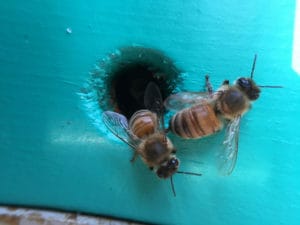Cornucopia’s Take: Pesticides applied to keep bees safe from parasites like Varroa mites have been found to alter bees’ gut microbiota. Growing evidence in the beekeeping world points to using management techniques to control pests and safeguard bee health.
Pesticides used to help bees may actually harm them
EurekAlert!
from Virginia Tech
 |
Pesticides beekeepers are using to improve honeybee health may actually be harming the bees by damaging the bacteria communities in their guts, according to a team led by a Virginia Tech scientist.
The discovery, published in the journal Frontiers in Microbiology, is a concern because alterations can affect the gut’s ability to metabolize sugars and peptides, processes that are vital for honeybee health. Beekeepers typically apply pesticides to hives to rid them of harmful parasites such as Varroa mites.
“Although helpful for ridding hives of parasites and pathogens, the chemicals in beekeeper-applied pesticides can be harmful to the bees,” said Mark Williams, an associate professor of horticulture in the College of Agriculture and Life Sciences and lead author. “Our research suggests that pesticides could specifically impact the microbes that are crucial to honey bee nutrition and health.”

